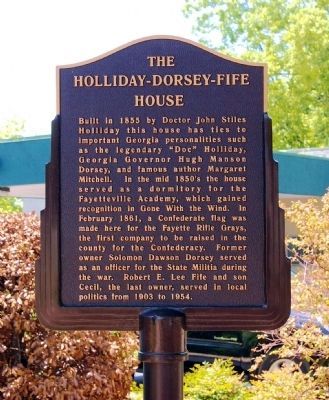Situated in Fayette County, Georgia, the Holliday-Dorsey-Fife House has been an impressive landmark since its construction in the second quarter of the nineteenth century. The house showcases a wonderful example of the Greek Revival style, and its unaltered condition has earned it national recognition by earning it a place on the National Register of Historic Places. It is situated in the county seat of Fayetteville, named in honor of the Marquis de La Fayette, and rooted in the changes made to the Creek Nation upon signing the first Treaty of Indian Springs in January 1821. Subsequent years saw incredible population growth as small farmers flocked to this new land. Fayette County was also challenging prevailing stereotypes about the obscurity of how institutions such as slavery were employed in the rural communities. Therefore, the Holliday-Dorsey-Fife House not only serves a functional purpose but testament to the hard work of the proud citizens of Fayette County and symbolizes the trials and tribulations they endured throughout the years.
History of the Holliday-Dorsey-Fife House
The Holliday-Dorsey-Fife House is a proud and impressive landmark in the city of Fayetteville, Georgia. Built sometime in the second quarter of the nineteenth century, and remodeled in 1855, it stands as an excellent example of vernacular expressions of the Greek Revival style. Despite suburban growth in the last quarter of the twentieth century, this early-nineteenth-century structure has remained intact and has been listed in the National Register of Historic Places. Figure 1 (Vanishing Georgia Collection) provides an awe-inspiring view of the house c. 1960.
Henry Burroughs Holliday
Robert Holliday’s legacy lives on in the form of his eldest son, Henry Burroughs Holliday (1819-1893). Henry was an American patriot who served in the Creek and Seminole wars of the 1830s, as well as the Mexican War of 1845-1846. He eventually married Alice Jane McKey in 1849 and moved to Griffin, then Valdosta. His only son, John Henry “Doc” Holliday (1852-1887), gained notoriety with Wyatt Earp at the OK Corral. William Cooper Holliday (1820-1868), Robert and Rebecca’s second son, married Jane Holcomb in 1842 and was a merchant until his death shortly after the Civil War. The fourth child, Robert Kennedy Holliday (1829-1872) married in 1848 and operated a hotel in Jonesboro. The youngest of Holliday’s children, Rebecca Ann Eliza (1839-1911), married Joseph H. Jones and Alpheus McCoin. Robert Holliday probably retired in 1859 when the sale of liquor was prohibited in the county. He died in 1862 and was buried next to his wife in the Fayetteville City Cemetery. John Stiles Holliday (1818-1868), the third son, married Permelia Ware in 1844 and returned to Fayetteville where he was a medical practitioner. He bought property between Fayetteville and Bennett’s Mill, which started the partnership with George W. Ware Jr. and became one of the largest mercantile establishments in 1860. John and Permelia Holliday had four children, one of whom was responsible for the construction of the historic Holliday-Dorsey-Fife House in 1855.
Business Ventures
John Stiles Holliday was a successful businessman with several investments in the Fayetteville, Georgia area. He had formed a partnership with George W. Ware and they owned a grist and saw mill, as well as Fayetteville’s largest mercantile store. He had also acquired acreage in the county and likely farmed some of the land himself. On his town property, he had a vegetable garden, fruit trees, milk cows, chickens, and a smokehouse. His remodeling of lot #38 created the historic Holliday-Dorsey-Fife House which was used for two years by the Fayette Academy before he occupied it in 1857.
John Stiles Holliday was a respected figure in Fayetteville, Georgia in the early 1800s. He was a doctor, a slave-holder, and an investor in several businesses. By 1850, the census showed him owning six slaves, and by 1860 that number had increased to thirteen. He had formed a partnership with George W. Ware and they owned a grist and saw mill, as well as Fayetteville’s largest mercantile store. He also had acquired acreage in the county and likely farmed some of the land himself. On his town property, he had a vegetable garden, fruit trees, milk cows, chickens, and a smokehouse. His remodeling of the house on lot #38 created the historic Holliday-Dorsey-Fife House which was used for two years by the Fayette Academy before he occupied it in 1857.
Legacy of Solomon Dorsey
Solomon Dorsey, an influential citizen in the town of Fayetteville, was a veteran of the Confederate Army of Tennessee and a trustee of the Methodist Episcopal Church South. At 18 years old, he married Sarah Glass, daughter of another early Henry County pioneer Manson Glass, and by the 1850s they were living in or near Fayetteville. There, Solomon Dorsey had become a large landowner and owned several lots in town, as well as a significant number of slaves. After his parents died in 1870 and 1871, Solomon bought the Holliday House, matching with its purchase the stylish houses that his siblings Stephen and Althea had created for themselves before the Civil War.
He continued to farm, his principal source of income, until he died in 1901. In 1903, R. A. Hemphill of Atlanta bought from Solomon Dorsey’s estate the eight town lots, and a warranty deed conveying the property from Hemphill to Robert E. Lee Fife was executed in 1910. The Fifes occupied the house longer than the Dorseys or the Holidays, with five children growing to adulthood in the house. In 1988, C. Wayne Bramlett purchased the house and its existing lot, and it was listed in the National Register of Historic Places in 2008. The City of Fayetteville purchased the house in 1999 and established a cooperative relationship between the Downtown Development Authority and the Fayetteville Main Street Program, which opened the Holliday-Dorsey-Fife House Museum in May 2003. This proud and positive history of the house is evidence of the legacy of Solomon Dorsey and his family.
The Holliday-Dorsey-Fife House is a renowned and unique landmark in the cultural landscape of Fayetteville, Georgia. Built during the emergence of Fayette County’s vibrant community of small farmers in the 19th century, and remodeled to reflect the stylistic expression of the Greek Revival style in 1855, this structure has remained largely intact over time despite suburban growth. It serves as an important reminder of Fayette County’s development and resilience over time, withstanding Union and Confederate conflicts, the collapse of cotton markets in the 1920s, and more recently, expansive suburban growth. Its place on the National Register of Historic Places guarantees that it will serve as a proud piece of Fayette County heritage for many years to come.






